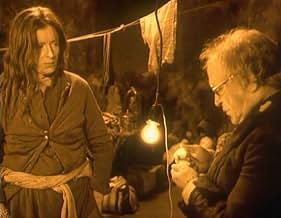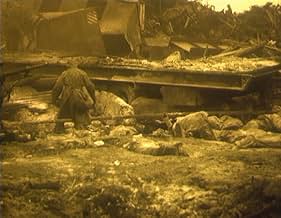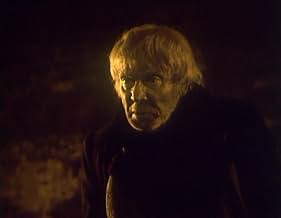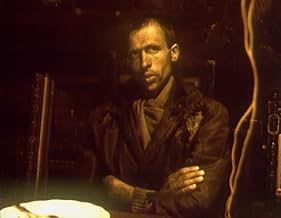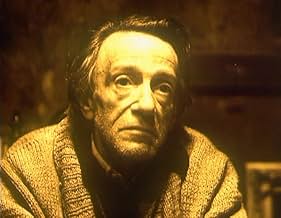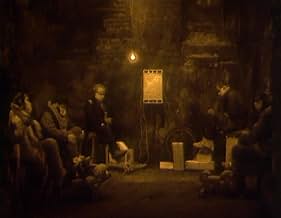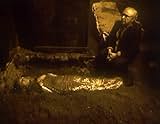Pisma myortvogo cheloveka
- 1986
- 1h 27min
Tras el holocausto nuclear, un grupo de intelectuales trata de encontrar esperanza en el pálido e incoloro nuevo mundo. Entre ellos, un profesor de historia intenta contactar por carta con s... Leer todoTras el holocausto nuclear, un grupo de intelectuales trata de encontrar esperanza en el pálido e incoloro nuevo mundo. Entre ellos, un profesor de historia intenta contactar por carta con su hijo desaparecido.Tras el holocausto nuclear, un grupo de intelectuales trata de encontrar esperanza en el pálido e incoloro nuevo mundo. Entre ellos, un profesor de historia intenta contactar por carta con su hijo desaparecido.
- Dirección
- Guionistas
- Elenco
- Premios
- 1 premio ganado en total
- Khyummel-otets
- (as I. Ryklin)
- Anna
- (as V. Mayorova)
- Pastor
- (as V. Dvorzhetskiy)
- Tereza
- (as S. Smirnova)
- Vrach
- (as Ye. Platokhin)
- Dirección
- Guionistas
- Todo el elenco y el equipo
- Producción, taquilla y más en IMDbPro
Opiniones destacadas
The movie is unremitting in its depressing depiction of a dead world. I was stuck between turning it off because it was almost sacrilegiously depressing, and remaining because of the sheer cataclysmic beauty. The images are mostly tinted yellow, although some shots are in tints of blue. There is no way this experience is going to allow you the respite of polychromatic images.
There is a body of work that deals with the end of humankind in cinema, but any example I can think of seems completely notional in conception, this one actually felt like a recording of the end of days, as unflinchingly profane as a documentary of viaticums.
I think it's also a tombstone for communism in Russia, suggested as a blind alley, and advocates a return to pre-revolutionary values regarding family and religion. But only in an intensely personal way, as if recounting the death of a close family member. It is more than a warning against nuclear war. In its parodying of ridiculous, pontificating, and obstructive authority, it's an emesis of authoritarian communism, a whole-hearted, wholesale rejection.
As an endnote, there's a dolly-out in the first few minutes of the film that left my jaw on the floor, practically the best shot I've ever seen in cinema, my congratulations to Konstantin Lopushansky and his team.
The story revolves on Rolan Bykov as a scientist – former Nobel Price winner, even – who entrenched himself underneath the remnants of a library building along with his wife and a handful of co-workers. The titular letters are addressed to his son whom the scientist hasn't seen or heard from since the catastrophe. The letters and above all the hope his son is still alive somewhere is what keeps the poor man going, but how long can you hold on to hope when you see everything and everyone around you dying? "Letters from a Dead Man" is a difficult but ultimately very rewarding cinematic experience to endure. Difficult, of course, because of the emotionally devastating imagery and atmosphere, and because there's actually very little substantial content. We literally stare at a handful of people languishing and eventually dying, with only a small hint at hope near the end. And rewarding because of the depiction of genuine humane sentiments and the thought-provoking messages. It's also highly remarkable how "Letters from a Dead Man" remains continuously vague regarding the cause of the apocalypse and eventually even searches the guilt in the own heart. In a time where movies released on the other side of the Iron Curtain (in Europe and particularly the USA) routinely blamed Russia for the potentially upcoming apocalypse, this tale suggests the root cause of the catastrophe lies in a human error during the launch of a space shuttle. The entire cast gives away tremendous performances. I don't know if these people are veteran actors and actresses in their home countries, but their grimaces and catatonic behavior suggest that they were selected especially for this type of discouraging parable. Fantastic film; though obviously not fit for all occasions and/or audiences.
If you find this film, take your time any rainy day, and drift away in a world of dead and dying.
This movie is a warning. It is scary to think how many times the world was on the verge of the Apocalypse. Not the divine Apocalypse, but one that can fly on the wings of a rocket launched by a foggy enemy.
Rolan Bykov, I was once again convinced of this, one of the best actors of Soviet cinema. He so organically played the role of the "Dead" ... well, what can I say? Master!
The letters that the hero of Bykov (incidentally, a professor who received the Nobel Prize) writes to his late son, only reinforce the already gloomy atmosphere of the film.
But, nevertheless, there is some optimism in the film. What can not but rejoice. However, I was insincere when I said that the film sucked all the positive emotions out of me. One more thing remains: hope. Part of me hopes that one day we will wake up and the world will no longer have nuclear weapons. But the other part, however, understands that a world without nuclear weapons is the world that is discussed in this film. This is a world in which there is nothing that holds back human destructive nature.
A scary movie ... hopefully not prophetic.
<b id="_d">...</b>
It's more a natural extension of the sort of bleak, introspective, and visually stylized substance of certain Tarkovsky films, and rather than suggesting Lopushansky was ripping off Tarkovsky, I instead hope to compare them in a way that's complementary to Lopushansky. In fact, Dead Man's Letters has moments that got to me more on a gut level than just about anything Tarkovsky directed, and with this film, he really doesn't overstay his welcome with a runtime of 83 minutes (some Tarkovsky films can have somewhat challenging runtimes).
It's the fact both made movies in Russia, both dealt with dark subject matter, and both were willing to use similarly striking color schemes visually that makes me want to compare the two. At the risk of disparaging Tarkovsky, too, it's been many years since I saw the bulk of his filmography, and now I'm older (though not necessarily wiser), I may be able to go back and appreciate certain titles of his some more. As for Lopushansky, the only other film of his I've seen is 1989's A Visitor to a Museum, which is similar to Dead Man's Letters in some way, albeit longer and more ambitious... surprisingly, I think I like Dead Man's Letters a little more, though.
It's worth experiencing for its atmospheric post-apocalyptic qualities alone, as well as for a couple of key sequences that really sneak up on you and prove devastating. It's not a fun watch, but it felt rewarding and worth the time for sure.
¿Sabías que…?
- TriviaThe filmmakers took great care to continuously remind their viewers that what they're seeing is not happening in the Soviet Union. To ensure this, a lot of foreign items have been placed in the backgrounds which surely immediately caught the eye of the contemporary viewer. There is not a single object with Cyrillic letters, but there are plenty with English ones. Many items are Western consumer goods which were rare in the Soviet Union in the 1980s. Particular examples are beer cans and a bottle of Jagermeister on a desk. The weapons the soldiers wield are also not even resembling Soviet rifles which would've been familiar to all viewers who completed their military services. They look more like a strange "crossbreed" of American M-16 and M-1 rifles. The vehicle the soldiers are using is a MAZ missile trailer truck, but the same vehicle was also built for the civilian market and sold to many countries. The helicopter that shows up in one of the scenes is a Kamov Ka-26 which was never used by the Soviet military (and in fact only one Warsaw Pact country did, Hungary). The hovercraft that is seen turning and leaving is also not a (known) military vehicle, but anyone in the 1980s should've associated the image with the air-cushion ferries on the English Channel which were a famous and novel technical achievement at the time.
- Citas
Unknown: We should acknowledge the fact that the whole history of mankind is a story of a slow suicide commited by a living matter that by sheer accident acquired the abilty to think, but that did not know what to do with this fateful capacity. Full stop.
Selecciones populares
- How long is Dead Man's Letters?Con tecnología de Alexa
Detalles
- Tiempo de ejecución
- 1h 27min(87 min)
- Color
- Mezcla de sonido
- Relación de aspecto
- 1.37 : 1

